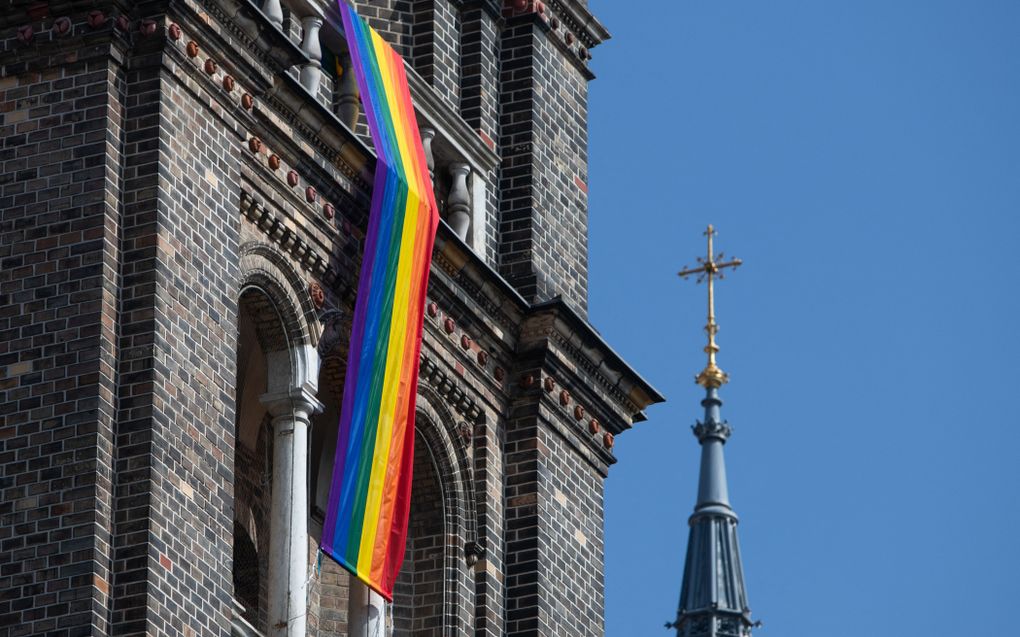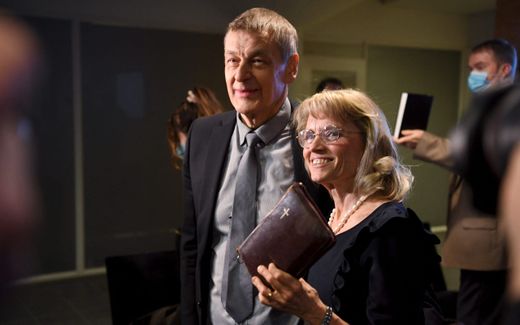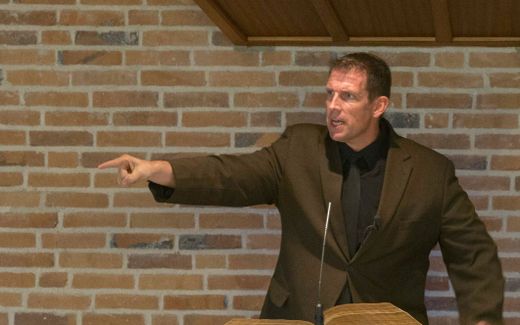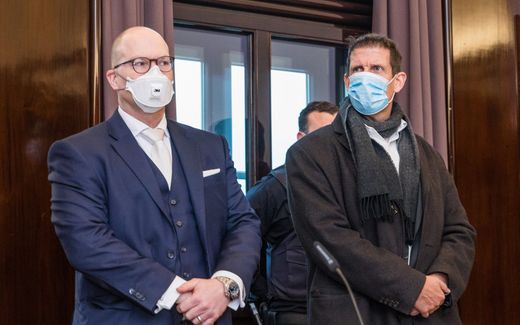Räsänen was not the only homophobia court case; there were also Latzel and Kort
28-05-2022
European Union
Addy de Jong, RD

Photo AFP, Alex Halada
European Union
Three Christians in three European countries were acquitted this year of incitement of hatred against homosexuals. Separate issues? Yes, but the cases against the Dutch Rev Kort, the German pastor Latzel and the Finnish politician Räsänen show strong similarities.
Judicial experts will always tell laypeople: do not compare one case with the other too quickly. Every process is different. Almost always, the context differs. Details or tiny differences in nuances can lead the one time to a verdict and the other time to an acquittal. Furthermore, the judicial systems differ per country as well, also within Europe.
So, the charges of Rev A. Kort and the development of his case are no copy of the case against pastor O. Latzel. And that the Finnish Christian Democratic Päivi Räsänen was acquitted from the charge of incitement against homosexuals on March 30 does not guarantee that a similar case against a Bremen pastor will end the same. Things are not that easy.
Rightly, Gerrit van den Brink, a judicial expert, warns in the Dutch daily Reformatorisch Dagblad for drawing too many conclusions from one or a few court hearings. He points out that hearings are always about "a specific statement in a specific context by a specific person". The case against pastor Latzel might have had a different ending if another judge had looked at it. And even if Räsänen would have been convicted, we could not have concluded that the Fins could make no statements about homosexuality based on the Bible, Van den Brink says.
Yet, having said all of that, no one can have missed that the three cases mentioned above, in the Netherlands, Germany and Finland, show remarkable similarities. And all three of them ended in the same way, namely in acquittal or refrainment from prosecution. Four points of unmistakable similarity.
1. Three orthodox Christians
Yes, if you look very closely, you see that the trio differs greatly among themselves. Two are pastors, and one is a politician (be it that she married a Lutheran pastor). Members of the denomination of Rev Kort would have problems with a woman pursuing an intensive career in politics as Päivi Räsänen did. The mother of five children and ten grandchildren was not only leader of the Finnish Democrats (from 2004 up to 2015) but also minister of Domestic Affairs (from 2011 up to 2015) and is currently the leader of the fraction of the Christian Democrats in the Finnish Parliament.
Furthermore, the religious contexts of the three accused differ too. A YouTube clip of a sermon of pastor Latzel on February 18 in the Mennonite congregation of Irlich ends with a call to come forward after the sermon if one wants to give his heart to Jesus. Hearing such words, members of the reformed congregation of Rev Kort would not feel very much at home.

But someone who looks at it more distantly sees three Christians who, from personal faith, want to take the Bible seriously as the Word of the living God, also in the area of relationships and sexuality; Christians who read the Scriptures on these topics the same way as the Christian church has done that for centuries.
And Christians who, be it a minister or a politician, experience a strong calling to publicly express their vision on this theme, including homosexuality. Because they share the opinion that this vision is not only important for themselves but for the good of the whole of society, and all three of them have come under fire for their statements.
2. Three similar accusations
It is true that the tone and the vocabulary of the three persons differ. Without question, pastor Latzel used the sharpest words. In his marriage seminar in 2019, he classified expressions of homosexuality as "degenerative forms of society", talked about the "devilish homo lobby", and called the gender ideology (dependent on how you translate the German term) "dung", "junk", or "filth."
Like the Bremer pastor, Rev Kort referred to the creation order but was more careful with his words. In a letter to the city council of his hometown Krimpen aan den IJssel, he wrote about "calling sins" that have to be "banned."

Räsänen asked the Evangelical Lutheran Church of Finland on Twitter in 2019 whether financially supporting Pride Week was the right thing to do. "How can the church's doctrinal foundation, the Bible, be reconciled with promoting sins and shame as a reason for pride", she tweeted while adding an image of Romans 1, 24-17.
But despite the differences in tone, the three cases were about the same matter. All three criticised the mainstream view on sexuality with the Bible in their hands. That was labelled as discrimination, demonising homosexuals and LGBTs, and incitement by opponents. And the same statements led them to official accusations.
Accusations in which the prosecutors filled in the statements of the aforementioned Christians. Just like the prosecutor in the Latzel case did. According to her, the pastor "refused homosexuals the right to participate equally in public life", "incited hatred against gays", and even violated their "human dignity."
3. Thrice the same accuser
No, the Reformed denomination did not accuse Rev Kort of his letter to the city council; far from it. In that sense, the situation differed from the German pastor Latzel and the Finnish politician Räsänen. The pastor from Bremen was accused by his church, the Protestant church of Germany (EKD). Also, Räsänen was confronted by her denomination, the Evangelical Lutheran Church, which she had criticised in her controversial tweet. One of her accusers was a Lutheran theologian.
However, one similarity between the three cases has been the fact that the gay lobby presented itself as the insulted and the complaining party. In Bremen, one of the organisers of the annual gay pride, often called "Christopher Street Day" (after the Christopher Street in Manhattan, where many gays protested against police actions). In Finland, also one of the accusations came from this corner. In the Netherlands, gay activist Leon Houtzager wanted to prosecute Rev Kort. Houtzager is a former member of the civilian council of the liberal party VVD in Krimpen aan den IJssel and a board member of the Dutch organisation COC that propagates LGBT rights in his hometown Schiedam. The gay activist was supported by Tim Hofman, a well-known journalist in The Netherlands.
And do not underestimate the role of the famous lawyer Gerard Spong in the Dutch case. Spong identifies himself as bisexual and cohabitates with a man. He supported Houtzager with dedication when the activist submitted a complaint to the Dutch prosecutor because the prosecutor did not want to start a case against the reformed pastor.
4. Three times protected by the Constitution
Moreover, there are a few minor differences concerning the judicial process. The complainants in the case of Rev Kort got the least far. The prosecutor immediately classified the minister's statements as part of his freedom of religion and expression. Therefore, the prosecutor refused to prosecute. Houtzager then activated a special procedure to appeal the decision of the prosecutor. But also, that attempt was in vain. Therefore, there has not been a real court hearing in the case of Rev Kort.

The gay lobby in Finland succeeded a bit more. They were able to start an official court hearing against Mrs Räsänen. However, she was acquitted, also on the grounds of religious freedom and freedom of expression.
The homo lobby in Germany achieved the most. Pastor Latzel was initially convicted for incitement by the Amtsgericht Bremen, which sentenced him to a fine of 8,100 euros. However, the Landgericht Bremen undid that sentence. No, this higher court said: the pastor's statements are classified under – there it is again – freedom of expression and religion.
What is the current situation? The case of Rev Kort seems to be closed definitively. That case has been finished judicially. In the case of Räsänen, the prosecutor went into appeal. That process has to start yet. Also, in Bremen, the opposition requested an appeal. Thus, two out of three cases are not close to being done.
"Judge does not want to silence public debate in criminal law"
Thus far, in three different cases in three different Western European countries, the judicial branch has not blocked any prosecution of Christians who, based on the Bible, criticise homosexuality. Rev Kort? Pastor Latzel? MP Räsänen? All of them were allowed to say what they said, the third power of the trias politica (separation between the judicial power, the legislative power and the executive power) ruled. Every time, constitutional rights were decisive: despite the prohibition of discrimination, the rights of freedom of expression and religion were crucial.

"That is gratifying", dr Matthijs de Blois responds. Until 2017, De Blois was a scientist at Utrecht University. "The judge has withstood the temptation to silence the social debate on sensitive issues with the criminal law. I think that is a good decision. Now, the social discussion can go on without the threat of criminal prosecution."
Prof dr Paul van Sasse van IJsselt shares that opinion on the developments. "It seems like judges do not feel like applying the criminal code too hastily in this kind of cases", the expert on justice and religion says. "I think that the three cases show the general view of the judicial branch on its role. In the case of Latzel or Räsänen, judges do not say that everything they said is okay. However, they do not feel the need to punish these statements with fines or even with prison sentences. I agree with that approach. An open social debate is oxygen for our democracy."
Yet, the expert wants to add a contramould: "In my eyes, this approach means that, if freedom of expression within the social debate goes that far, it should also be allowed to say many things about faith and believers, even though these expressions can also be experienced as hurtful." That last thing does not mean that "people on both sides are relieved from their responsibility to think carefully about their words. Offending is not a virtue."
Accusation
The current accusation is that the constitutional right of freedom of religion gives believers more freedom to say things than non-believers. However, both experts are not impressed by that statement. De Blois: "Yes, freedom of religion is in principle only for believers. But a non-believer might become a believer." Van Sasse van IJsselt: "Someone who does not go to demonstrations does not use his right to protest. But that does not mean that this right is only a privilege for a certain group of citizens."
Thus, both of them do not see it happen that Western European politicians – under the guise of the argument: we are done with the freedom of expression and religion – will abolish the freedom of religion. That would make politicians like Räsänen and ministers like Kort and Latzel more vulnerable.
De Blois: "There are very good arguments to assert that freedom of religion is an independent value which a combination of some other rights cannot replace. The right to freedom of religion has its own domain, including issues like male circumcision or ritual slaughter."
Van Sasse van IJsselt: "Freedom of religion is actually the mother of all other rights to freedom. The constitutional right has been part of many international agreements to which the Netherlands and other European countries have been bound. In a practical sense and a judicial sense, it would therefore be very difficult to erase or limit the right."
Related Articles





